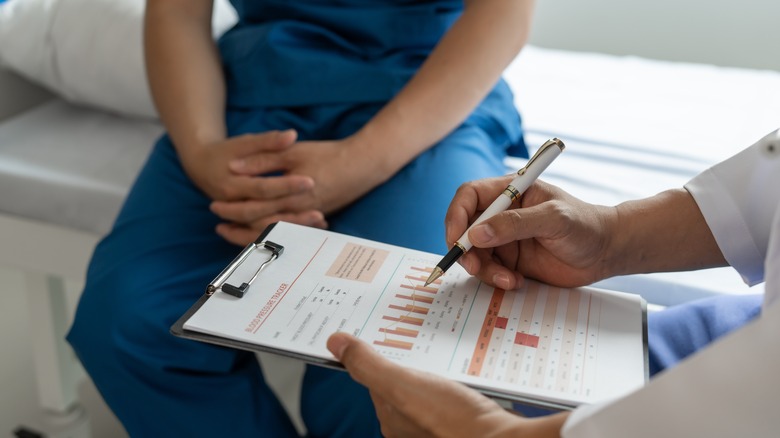Here's What It Means If You're Diagnosed With An Enlarged Prostate
The prostate goes through two cycles of growth in a man's life, first when he reaches puberty and second around the age of 25. The prostate continues to grow throughout the man's life, which is why it's rather common for men to develop an enlarged prostate as they age. This condition is also known as benign prostatic hyperplasia, and MedlinePlus says 90% of men over 80 develop an enlarged prostate simply due to age. An enlarged prostate is not linked to an increased risk for prostate cancer.
Men with an enlarged prostate might not be aware they have this condition because it might not have symptoms. A frequent need to urinate, particularly at night, is a common symptom. Someone with an enlarged prostate might have trouble starting to pee or be unable to completely empty the bladder. An enlarged prostate might also cause a weak stream of urine. Your symptoms, the size of your prostate, and other health conditions can determine the right course of treatment if you're diagnosed with an enlarged prostate.
Treatments and risk factors for an enlarged prostate
Reducing the amount of fluids and limiting alcohol and caffeine can be options to reduce symptoms of an enlarged prostate. Your doctor might also recommend that you practice holding your urine longer or work on strengthening your pelvic floor. Medications like alpha blockers to relax the prostate and 5-alpha reductase inhibitors to reduce prostate growth can also help treat an enlarged prostate. If medications and lifestyle changes don't reduce your symptoms, there are several minimally invasive procedures to either expand your urethra or break up the prostate tissue. Surgery is also an option to remove the prostate tissue (per National Institute of Diabetes and Digestive and Kidney Diseases).
Although men over 40 are at a higher risk for developing an enlarged prostate, you could also be at risk if members of your family also had the condition. Obesity, cardiovascular disease, and type 2 diabetes increase your risk of an enlarged prostate. You're also more likely to have an enlarged prostate if you don't exercise.

